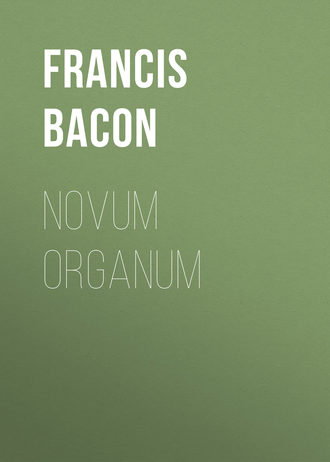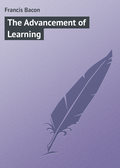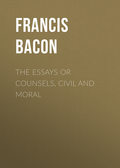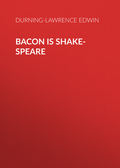
Фрэнсис Бэкон
Novum Organum
The preparations of bodies, also, for the reception of cold should not be omitted, such as that water a little warmed is more easily frozen than that which is quite cold, and the like.
Moreover, since nature supplies cold so sparingly, we must act like the apothecaries, who, when they cannot obtain any simple ingredient, take a succedaneum, or quid pro quo, as they term it, such as aloes for xylobalsamum, cassia for cinnamon. In the same manner we should look diligently about us, to ascertain whether there may be any substitutes for cold, that is to say, in what other manner condensation can be effected, which is the peculiar operation of cold. Such condensations appear hitherto to be of four kinds only. 1. By simple compression, which is of little avail toward permanent condensation, on account of the elasticity of substances, but may still, however, be of some assistance. 2. By the contraction of the coarser, after the escape or departure of the finer parts of a given body; as is exemplified in induration by fire, and the repeated heating and extinguishing of metals, and the like. 3. By the cohesion of the most solid homogeneous parts of a given body, which were previously separated, and mixed with others less solid, as in the return of sublimated mercury to its simple state, in which it occupies much less space than it did in powder, and the same may be observed of the cleansing of all metals from their dross. 4. By harmony, or the application of substances which condense by some latent power. These harmonies are as yet but rarely observed, at which we cannot be surprised, since there is little to hope for from their investigation, unless the discovery of forms and confirmation be attained. With regard to animal bodies, it is not to be questioned that there are many internal and external medicines which condense by harmony, as we have before observed, but this action is rare in inanimate bodies. Written accounts, as well as report, have certainly spoken of a tree in one of the Tercera or Canary Islands (for I do not exactly recollect which) that drips perpetually, so as to supply the inhabitants, in some degree, with water; and Paracelsus says that the herb called ros solis is filled with dew at noon, while the sun gives out its greatest heat, and all other herbs around it are dry. We treat both these accounts as fables; they would, however, if true, be of the most important service, and most worthy of examination. As to the honey-dew, resembling manna, which is found in May on the leaves of the oak, we are of opinion that it is not condensed by any harmony or peculiarity of the oak leaf, but that while it falls equally upon other leaves it is retained and continues on those of the oak, because their texture is closer, and not so porous as that of most of the other leaves.164
With regard to heat, man possesses abundant means and power; but his observation and inquiry are defective in some respects, and those of the greatest importance, notwithstanding the boasting of quacks. For the effects of intense heat are examined and observed, while those of a more gentle degree of heat, being of the most frequent occurrence in the paths of nature, are, on that very account, least known. We see, therefore, the furnaces, which are most esteemed, employed in increasing the spirits of bodies to a great extent, as in the strong acids, and some chemical oils; while the tangible parts are hardened, and, when the volatile part has escaped, become sometimes fixed; the homogeneous parts are separated, and the heterogeneous incorporated and agglomerated in a coarse lump; and (what is chiefly worthy of remark) the junction of compound bodies, and the more delicate conformations are destroyed and confounded. But the operation of a less violent heat should be tried and investigated, by which more delicate mixtures and regular conformations may be produced and elicited, according to the example of nature, and in imitation of the effect of the sun, which we have alluded to in the aphorism on the instances of alliance. For the works of nature are carried on in much smaller portions, and in more delicate and varied positions than those of fire, as we now employ it. But man will then appear to have really augmented his power, when the works of nature can be imitated in species, perfected in power, and varied in quantity; to which should be added the acceleration in point of time. Rust, for instance, is the result of a long process, but crocus martis is obtained immediately; and the same may be observed of natural verdigris and ceruse. Crystal is formed slowly, while glass is blown immediately: stones increase slowly, while bricks are baked immediately, etc. In the meantime (with regard to our present subject) every different species of heat should, with its peculiar effects, be diligently collected and inquired into; that of the heavenly bodies, whether their rays be direct, reflected, or refracted, or condensed by a burning-glass; that of lightning, flame, and ignited charcoal; that of fire of different materials, either open or confined, straitened or overflowing, qualified by the different forms of the furnaces, excited by the bellows, or quiescent, removed to a greater or less distance, or passing through different media; moist heats, such as the balneum Mariæ, and the dunghill; the external and internal heat of animals; dry heats, such as the heat of ashes, lime, warm sand; in short, the nature of every kind of heat, and its degrees.
We should, however, particularly attend to the investigation and discovery of the effects and operations of heat, when made to approach and retire by degrees, regularly, periodically, and by proper intervals of space and time. For this systematical inequality is in truth the daughter of heaven and mother of generation, nor can any great result be expected from a vehement, precipitate, or desultory heat. For this is not only most evident in vegetables, but in the wombs of animals also there arises a great inequality of heat, from the motion, sleep, food, and passions of the female. The same inequality prevails in those subterraneous beds where metals and fossils are perpetually forming, which renders yet more remarkable the ignorance of some of the reformed alchemists, who imagined they could attain their object by the equable heat of lamps, or the like, burning uniformly. Let this suffice concerning the operation and effects of heat; nor is it time for us to investigate them thoroughly before the forms and conformations of bodies have been further examined and brought to light. When we have determined upon our models, we may seek, apply, and arrange our instruments.
4. The fourth mode of action is by continuance, the very steward and almoner, as it were, of nature. We apply the term continuance to the abandonment of a body to itself for an observable time, guarded and protected in the meanwhile from all external force. For the internal motion then commences to betray and exert itself when the external and adventitious is removed. The effects of time, however, are far more delicate than those of fire. Wine, for instance, cannot be clarified by fire as it is by continuance. Nor are the ashes produced by combustion so fine as the particles dissolved or wasted by the lapse of ages. The incorporations and mixtures, which are hurried by fire, are very inferior to those obtained by continuance; and the various conformations assumed by bodies left to themselves, such as mouldiness, etc., are put a stop to by fire or a strong heat. It is not, in the meantime, unimportant to remark that there is a certain degree of violence in the motion of bodies entirely confined; for the confinement impedes the proper motion of the body. Continuance in an open vessel, therefore, is useful for separations, and in one hermetically sealed for mixtures, that in a vessel partly closed, but admitting the air, for putrefaction. But instances of the operation and effect of continuance must be collected diligently from every quarter.
5. The direction of motion (which is the fifth method of action) is of no small use. We adopt this term, when speaking of a body which, meeting with another, either arrests, repels, allows, or directs its original motion. This is the case principally in the figure and position of vessels. An upright cone, for instance, promotes the condensation of vapor in alembics, but when reversed, as in inverted vessels, it assists the refining of sugar. Sometimes a curved form, or one alternately contracted and dilated, is required. Strainers may be ranged under this head, where the opposed body opens a way for one portion of another substance and impedes the rest. Nor is this process or any other direction of motion carried on externally only, but sometimes by one body within another. Thus, pebbles are thrown into water to collect the muddy particles, and syrups are refined by the white of an egg, which glues the grosser particles together so as to facilitate their removal. Telesius, indeed, rashly and ignorantly enough attributes the formation of animals to this cause, by means of the channels and folds of the womb. He ought to have observed a similar formation of the young in eggs which have no wrinkles or inequalities. One may observe a real result of this direction of motion in casting and modelling.
6. The effects produced by harmony and aversion (which is the sixth method) are frequently buried in obscurity; for these occult and specific properties (as they are termed), the sympathies and antipathies, are for the most part but a corruption of philosophy. Nor can we form any great expectation of the discovery of the harmony which exists between natural objects, before that of their forms and simple conformations, for it is nothing more than the symmetry between these forms and conformations.
The greater and more universal species of harmony are not, however, so wholly obscure, and with them, therefore, we must commence. The first and principal distinction between them is this; that some bodies differ considerably in the abundance and rarity of their substance, but correspond in their conformation; others, on the contrary, correspond in the former and differ in the latter. Thus the chemists have well observed, that in their trial of first principles sulphur and mercury, as it were, pervade the universe; their reasoning about salt, however, is absurd, and merely introduced to comprise earthy dry fixed bodies. In the other two, indeed, one of the most universal species of natural harmony manifests itself. Thus there is a correspondence between sulphur, oil, greasy exhalations, flame, and, perhaps, the substance of the stars. On the other hand, there is a like correspondence between mercury, water, aqueous vapor, air, and, perhaps, pure inter-sidereal ether. Yet do these two quaternions, or great natural tribes (each within its own limits), differ immensely in quantity and density of substance, while they generally agree in conformation, as is manifest in many instances. On the other hand, the metals agree in such quantity and density (especially when compared with vegetables, etc.), but differ in many respects in conformation. Animals and vegetables, in like manner, vary in their almost infinite modes of conformation, but range within very limited degrees of quantity and density of substance.
The next most general correspondence is that between individual bodies and those which supply them by way of menstruum or support. Inquiry, therefore, must be made as to the climate, soil, and depth at which each metal is generated, and the same of gems, whether produced in rocks or mines, also as to the soil in which particular trees, shrubs, and herbs, mostly grow and, as it were, delight; and as to the best species of manure, whether dung, chalk, sea sand, or ashes, etc., and their different propriety and advantage according to the variety of soils. So also the grafting and setting of trees and plants (as regards the readiness of grafting one particular species on another) depends very much upon harmony, and it would be amusing to try an experiment I have lately heard of, in grafting forest trees (garden trees alone having hitherto been adopted), by which means the leaves and fruit are enlarged, and the trees produce more shade. The specific food of animals again should be observed, as well as that which cannot be used. Thus the carnivorous cannot be fed on herbs, for which reason the order of feuilletans, the experiment having been made, has nearly vanished; human nature being incapable of supporting their regimen, although the human will has more power over the bodily frame than that of other animals. The different kinds of putrefaction from which animals are generated should be noted.
The harmony of principal bodies with those subordinate to them (such indeed may be deemed those we have alluded to above) are sufficiently manifest, to which may be added those that exist between different bodies and their objects, and, since these latter are more apparent, they may throw great light when well observed and diligently examined upon those which are more latent.
The more internal harmony and aversion, or friendship and enmity (for superstition and folly have rendered the terms of sympathy and antipathy almost disgusting), have been either falsely assigned, or mixed with fable, or most rarely discovered from neglect. For if one were to allege that there is an enmity between the vine and the cabbage, because they will not come up well when sown together, there is a sufficient reason for it in the succulent and absorbent nature of each plant, so that the one defrauds the other. Again, if one were to say that there is a harmony and friendship between the corn and the corn-flower, or the wild poppy, because the latter seldom grow anywhere but in cultivated soils, he ought rather to say, there is an enmity between them, for the poppy and the corn-flower are produced and created by those juices which the corn has left and rejected, so that the sowing of the corn prepares the ground for their production. And there are a vast number of similar false assertions. As for fables, they must be totally exterminated. There remains, then, but a scanty supply of such species of harmony as has borne the test of experiment, such as that between the magnet and iron, gold and quicksilver, and the like. In chemical experiments on metals, however, there are some others worthy of notice, but the greatest abundance (where the whole are so few in numbers) is discovered in certain medicines, which, from their occult and specific qualities (as they are termed), affect particular limbs, humors, diseases, or constitutions. Nor should we omit the harmony between the motion and phenomena of the moon, and their effects on lower bodies, which may be brought together by an accurate and honest selection from the experiments of agriculture, navigation, and medicine, or of other sciences. By as much as these general instances, however, of more latent harmony, are rare, with so much the more diligence are they to be inquired after, through tradition, and faithful and honest reports, but without rashness and credulity, with an anxious and, as it were, hesitating degree of reliance. There remains one species of harmony which, though simple in its mode of action, is yet most valuable in its use, and must by no means be omitted, but rather diligently investigated. It is the ready or difficult coition or union of bodies in composition, or simple juxtaposition. For some bodies readily and willingly mix, and are incorporated, others tardily and perversely; thus powders mix best with water, chalk and ashes with oils, and the like. Nor are these instances of readiness and aversion to mixture to be alone collected, but others, also, of the collocation, distribution, and digestion of the parts when mingled, and the predominance after the mixture is complete.
7. Lastly, there remains the seventh, and last of the seven, modes of action; namely, that by the alternation and interchange of the other six; but of this, it will not be the right time to offer any examples, until some deeper investigation shall have taken place of each of the others. The series, or chain of this alternation, in its mode of application to separate effects, is no less powerful in its operation than difficult to be traced. But men are possessed with the most extreme impatience, both of such inquiries, and their practical application, although it be the clew of the labyrinth in all greater works. Thus far of the generally useful instances.
LI. The twenty-seventh and last place we will assign to the magical instances, a term which we apply to those where the matter or efficient agent is scanty or small, in comparison with the grandeur of the work or effect produced; so that even when common they appear miraculous, some at first sight, others even upon more attentive observation. Nature, however, of herself, supplies these but sparingly. What she will do when her whole store is thrown open, and after the discovery of forms, processes, and conformation, will appear hereafter. As far as we can yet conjecture, these magic effects are produced in three ways, either by self-multiplication, as in fire, and the poisons termed specific, and the motions transferred and multiplied from wheel to wheel; or by the excitement, or, as it were, invitation of another substance, as in the magnet, which excites innumerable needles without losing or diminishing its power; and again in leaven, and the like; or by the excess of rapidity of one species of motion over another, as has been observed in the case of gunpowder, cannon, and mines. The two former require an investigation of harmonies, the latter of a measure of motion. Whether there be any mode of changing bodies per minima (as it is termed), and transferring the delicate conformations of matter, which is of importance in all transformations of bodies, so as to enable art to effect, in a short time, that which nature works out by divers expedients, is a point of which we have as yet no indication. But, as we aspire to the extremest and highest results in that which is solid and true, so do we ever detest, and, as far as in us lies, expel all that is empty and vain.
LII. Let this suffice as to the respective dignity of prerogatives of instances. But it must be noted, that in this our organ, we treat of logic, and not of philosophy. Seeing, however, that our logic instructs and informs the understanding, in order that it may not, with the small hooks, as it were, of the mind, catch at, and grasp mere abstractions, but rather actually penetrate nature, and discover the properties and effects of bodies, and the determinate laws of their substance (so that this science of ours springs from the nature of things, as well as from that of the mind); it is not to be wondered at, if it have been continually interspersed and illustrated with natural observations and experiments, as instances of our method. The prerogative instances are, as appears from what has preceded, twenty-seven in number, and are termed, solitary instances, migrating instances, conspicuous instances, clandestine instances, constitutive instances, similar instances, singular instances, deviating instances, bordering instances, instances of power, accompanying and hostile instances, subjunctive instances, instances of alliance, instances of the cross, instances of divorce, instances of the gate, citing instances, instances of the road, supplementary instances, lancing instances, instances of the rod, instances of the course, doses of nature, wrestling instances, suggesting instances, generally useful instances, and magical instances. The advantage, by which these instances excel the more ordinary, regards specifically either theory or practice, or both. With regard to theory, they assist either the senses or the understanding; the senses, as in the five instances of the lamp; the understanding, either by expediting the exclusive mode of arriving at the form, as in solitary instances, or by confining, and more immediately indicating the affirmative, as in the migrating, conspicuous, accompanying, and subjunctive instances; or by elevating the understanding, and leading it to general and common natures, and that either immediately, as in the clandestine and singular instances, and those of alliance; or very nearly so, as in the constitutive; or still less so, as in the similar instances; or by correcting the understanding of its habits, as in the deviating instances; or by leading to the grand form or fabric of the universe, as in the bordering instances; or by guarding it from false forms and causes, as in those of the cross and of divorce. With regard to practice, they either point it out, or measure, or elevate it. They point it out, either by showing where we must commence in order not to repeat the labors of others, as in the instances of power; or by inducing us to aspire to that which may be possible, as in the suggesting instances; the four mathematical instances measure it. The generally useful and the magical elevate it.
Again, out of these twenty-seven instances, some must be collected immediately, without waiting for a particular investigation of properties. Such are the similar, singular, deviating, and bordering instances, those of power, and of the gate, and suggesting, generally useful, and magical instances; for these either assist and cure the understanding and senses, or furnish our general practice. The remainder are to be collected when we finish our synoptical tables for the work of the interpreter, upon any particular nature; for these instances, honored and gifted with such prerogatives, are like the soul amid the vulgar crowd of instances, and (as we from the first observed) a few of them are worth a multitude of the others. When, therefore, we are forming our tables they must be searched out with the greatest zeal, and placed in the table. And, since mention must be made of them in what follows, a treatise upon their nature has necessarily been prefixed. We must next, however, proceed to the supports and corrections of induction, and thence to concretes, the latent process, and latent conformations, and the other matters, which we have enumerated in their order in the twenty-first aphorism, in order that, like good and faithful guardians, we may yield up their fortune to mankind upon the emancipation and majority of their understanding; from which must necessarily follow an improvement of their estate, and an increase of their power over nature. For man, by the fall, lost at once his state of innocence, and his empire over creation, both of which can be partially recovered even in this life, the first by religion and faith, the second by the arts and sciences. For creation did not become entirely and utterly rebellious by the curse, but in consequence of the Divine decree, “in the sweat of thy brow shalt thou eat bread,” she is compelled by our labors (not assuredly by our disputes or magical ceremonies), at length, to afford mankind in some degree his bread, that is to say, to supply man’s daily wants.







